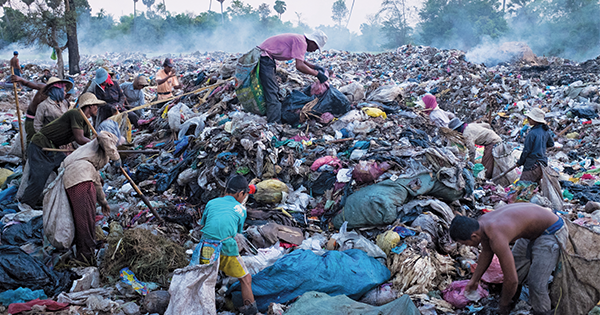
Twenty miles outside Cambodia’s ancient Angkor temples stretch rice paddies, fishponds, and cow pastures. It’s a sultry day, and sunset falls in amber rays across sugar palms. When I squint, I see colorful hills and swirling mist. Except the hills are rubbish, and the mist is smoke. Dozens of villagers work here atop this dump, raking through the refuse of the two million tourists who visit the splendorous ruins of an empire. Some families live in tarp shacks propped against garbage; others live beside rotting fields and polluted canals that run black. Workers rake through this fetid mess, scrounging for recyclables and edibles. Each person’s journey to this place is tragic—a lost job, ill health, forfeited property. They’re here because something went wrong.
I am here with my partner, photographer Jerry Redfern, to interview Cambodians about hunger—whether they routinely feel it; if so, why; and what they think could fix the problem. These questions are part of Bellyache, our project-in-progress documenting the stories of hungry people.
Worldwide, 795 million people “do not have enough food to lead a healthy active life,” according to the World Food Program. Yet the world currently produces enough food to feed everyone, everywhere. When Jerry and I ask people why they are hungry, their answers rarely describe a shortage of food.
At the dump, a 22-year-old man named Nan tows a heavy black sack. He was sick for five years, he says, and sold his seven acres of rice paddy for $1,500 to pay the doctor. It wasn’t enough, so he borrowed more and slid into debt. He’s healthy now, but dinner depends on the recyclables he collects each day: “Sometimes I can make money, but not every day.” Then he goes hungry.
Nan is happy to talk, but he doesn’t wish to be photographed: “I feel ashamed.” He’s afraid someone might recognize him. Nan has little, but he has pride. In that way, he is just like every hungry villager we interview, everywhere.

